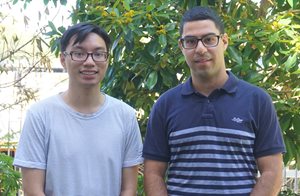December 21, 2018 Print
Two honours students from the Westmead Institute for Medical Research have received the University Medal in recognition of their outstanding academic performance at the University of Sydney.
 George Ghossein and Nicolas Canete received the University Medal for their outstanding academic performance.
George Ghossein and Nicolas Canete received the University Medal for their outstanding academic performance.
Recipients George Ghossein and Nicolas Canete completed their honours year at the Westmead Institute in heart research and HIV research respectively.
This is the second consecutive year that Westmead Institute students have received the university medal, which acknowledges strong academic performance throughout a student’s undergraduate degree and honours year.
Nicolas said the award was a huge recognition of his hard work.
“It feels mind-blowing to receive the award,” he said.
“It’s such an honour and a privilege, especially when I think about all the work I put into my project.”
He spent his honours year researching how HIV interacts with immune cells in colorectal tissue.
“It was fantastic to do my project at Westmead, because I was able to use colorectal tissue samples from real patients, instead of cell models,” he said.
“It really puts the potential impact of my research into perspective.
“Colorectal tissue is a common site for initial HIV infections, which then spread throughout the body.
“I developed new techniques that can extract single cell data from high parameter image data, and help us understand more about the interaction between HIV and immune cells.
“Ultimately, we hope to identify the specific cells involved in HIV infection, which will help develop techniques to block the infection from taking hold in the body.
“I’ll be continuing this project next year as a master student. I’m really happy to have received the university medal – it will encourage me throughout the rest of my research.”
George’s research focuses on using gene therapy as a possible treatment for cardiac injuries.
He investigated how a hormone, ghrelin, could be administered in the body to protect the heart against damage.
“It is well-established that ghrelin has a protective effect, so my research focused on how we can use the hormone to protect the heart against damage,” George explained.
“I investigated how we could use gene therapy to administer the hormone directly to the heart cells. Using gene therapy would allow us to avoid multiple injections of the hormone, making it easier for both patients and clinicians.
“This research has potential to expand our current knowledge on how we can treat and prevent cardiac injuries.”
George said he was pleased to have successfully completed his honours year.
“It’s a big relief to have submitted my thesis,” he said.
“It’s pretty exciting to see my hard work come to fruition, and to have been awarded because of it.
“I’m starting medicine next year, and it will be great to see how this research could be applied clinically.
“Completing my honours year was a rewarding step in my career.”
Congratulations George and Nicolas. We are so proud of you, and glad that you had such rewarding experiences at Westmead.
George Ghossein was supervised by Dr Eddy Kizana and Dr Cindy Kok.
Nicolas Canete was supervised by Associate Professor Andrew Harman, Professor Tony Cunningham, Dr Ellis Patrick and Heeva Baharlou.